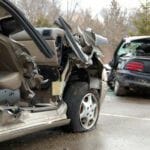The Dangers of Overweight Trucks
December 19, 2017 / Truck Accidents
Trucks weighing up to 40 tons (80,000 pounds) are legal on Indiana roads. In special circumstances and with the proper permits and fees paid, truck weights of up to 200,000 pounds—100 tons—are allowable. Neighboring Kentucky permits truck weights of up to 120,000 pounds as long as fees are paid and permits are obtained. State governments require fees in order to pay for the damages that accumulate from a steady stream of overweight trucks on our roads and bridges. Hauling overweight loads are hard on the trucks, too, though some trucks are built especially to haul extreme weights.
Overweight Scofflaws
Some truckers and trucking companies try to get away with hauling overweight loads without paying fees and obtaining permits. A few examples include:
- September, 2017: In Minnesota, a truck was overweight by nearly 86,000 pounds—165,900 pounds total. The truck was built to handle only an 80,000-pound load. It became sidelined when the excessive load blew out tires; eventually two tow truck operators and two tire repairers were needed to change the tires.
- June, 2017: In Rhode Island, a 16-axle truck was discovered carrying a 560,000-pound load, which is seven times heavier than what is allowed on the state’s bridges. The truck remained parked along I-95 for days because there were no easy answers as to how to get it out of the state without crossing bridges. The load consisted of one item, a generator. After two weeks, a permit was issued and the driver was instructed to take back-roads all the way to Massachusetts, the generator’s destination.
- June, 2016: In Massachusetts, where the load limit is 99,000 pounds, a truck carrying construction dirt was weighed at 134,900 pounds. It turned out that the dirt-carrying trucks were routinely, illegally, running significantly overweight.
During 2014, the U.S. Department of Transportation (USDOT) issued around 8,000 violation notices to companies with illegally-overweight trucks. That’s about one percent of all the violation notices handed out by the USDOT. Each violation can potentially cost a company thousands of dollars.
Overweight Trucks Are Harder to Stop
Not only do overweight trucks damage our infrastructure, they also are much more dangerous to others on the road. It would take almost 600 feet, or nearly two football fields, to stop a truck weighing 99,000 pounds traveling at 65 mph. But a truck that weighs 130,000 pounds traveling at the same speed would take over 100 feet farther to stop—around 720 feet total, or about 2-1/3 football fields.
Fatal Consequences
Consider how closely trucks sometimes follow passenger vehicles—or other trucks—on the highway and you begin to get a feel for how catastrophic an accident with an overweight truck could be. We need look no further than a 2015 wreck on I-35 in central Texas, where the driver of a passenger vehicle was killed and the truck’s driver was injured when the truck hit an overpass, collapsing it. Two others were injured by debris from the collapse. DMV spokesman Adam Shaivitz noted, “The motor carrier that struck the bridge did not have the legally required permit to carry an overweight load.”
How Can Accidents Happen?
Overweight trucks can cause accidents in a number of ways. Some examples include:
- The overweight truck lacks enough distance to stop.
- Tire blowouts caused by the strain of the excessive load can cause steering problems or driver errors.
- An improperly-secured load, which is more likely on an overloaded truck, means some or all of the load could fly off and hit other vehicles.
- An imbalance in the load can cause a rollover. A commercial truck’s high center of gravity means a rollover is more likely when it is transporting a higher weight.
An overloaded and overweight truck that does not have the proper permits means that the trucking company could be considered guilty of negligence and held legally responsible if an accident occurred.
When others breach their duty, we keep ours.
Indiana truck accident cases can be complex legal claims that require thorough investigation and demand aggressive litigation to secure the best possible outcome for the plaintiff. While monetary compensation can never undo the damage done as the result of a truck accident, a financial recovery can ease the financial burdens caused by overwhelming medical bills, loss of income, and disability.
If you or a loved one has been involved in an accident with a tractor-trailer, whether empty, full, or involving only the tractor portion of the truck, we suggest you talk with Indianapolis truck accident lawyer Mike Stephenson. With more than three decades of experience, substantial financial resources to commit to your case, and a commitment to the highest standards of client care, you can count on Mike. Contact him today by calling 1-317-825-5200 for a free accident consultation, or use our online contact form. At Stephenson Rife, we believe justice matters.

 Mike Stephenson has 40 years of experience and is a trusted advisor to many individuals and companies. His current practice is dominated by civil litigation in state and federal courts. He focuses much of his time on handling catastrophic injuries caused by all types of accidents, including motor vehicle, trucking, workplace injuries, product liability, and fire, just to name a few. He also works extensively in construction accidents. [
Mike Stephenson has 40 years of experience and is a trusted advisor to many individuals and companies. His current practice is dominated by civil litigation in state and federal courts. He focuses much of his time on handling catastrophic injuries caused by all types of accidents, including motor vehicle, trucking, workplace injuries, product liability, and fire, just to name a few. He also works extensively in construction accidents. [ 